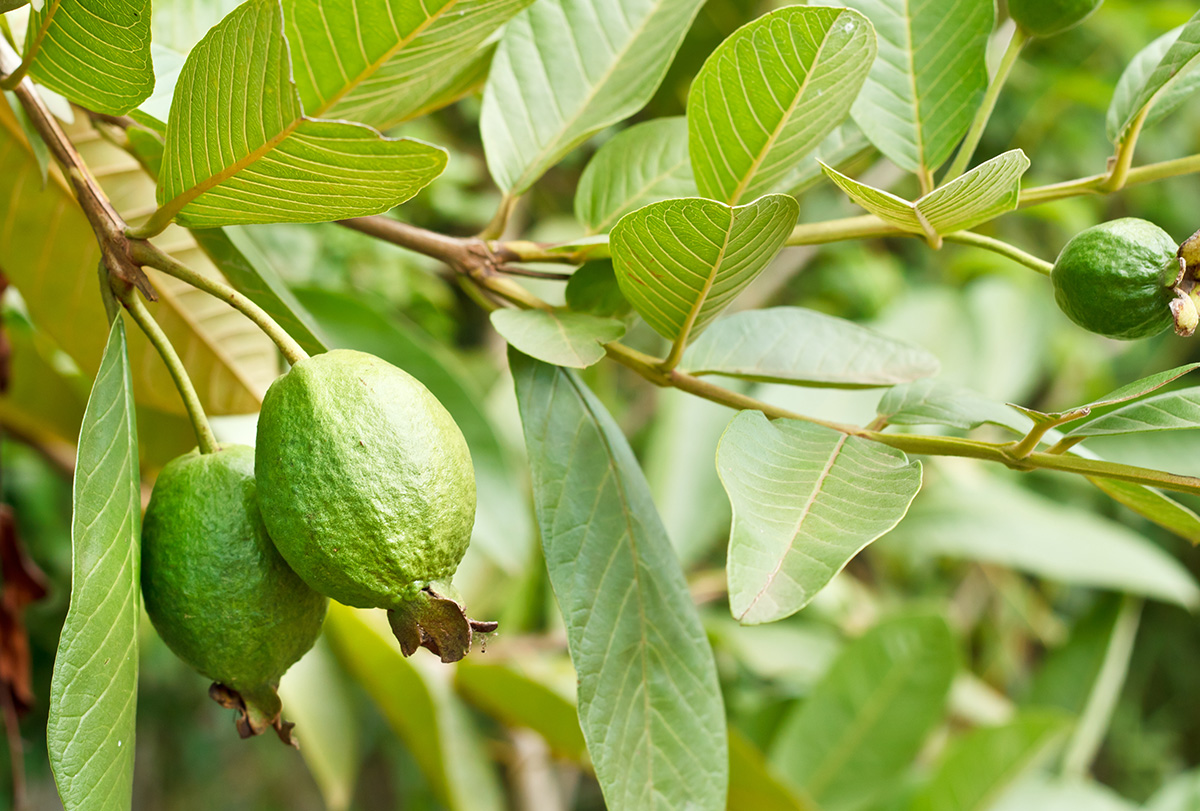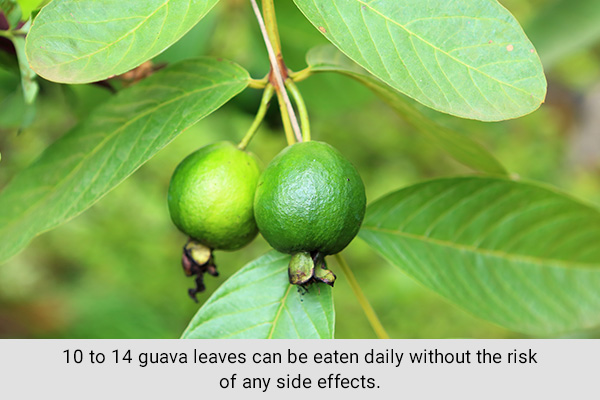In this article:
Guava is a tropical fruit famous for its high vitamin C content. But did you know its leaves have medicinal properties?

Various countries around the world make use of guava leaves to make decoctions, poultices, infusions, and teas to treat and manage various health conditions.
Yes! Not only are guava leaves nonpoisonous, but they also offer a variety of health benefits.
Uses of Guava Leaves
Folk medicine has used preparations of guava leaves to manage diarrhea and to treat rheumatism, diabetes, cough, and many more disorders. (1)
This article will take an in-depth look at the uses and benefits of guava leaves for health.
1. Aids in the management of diarrhea
Untreated and unmanaged diarrhea can be potentially life-threatening, especially in young children. Animal studies have found guava leaves can be useful in preventing infectious diarrhea by reducing its frequency and duration. (2)
A clinical trial in India also found a decoction of 14 guava leaves as a safe treatment for diarrhea in adults while also protecting the diversity of gut microorganisms that are normally destroyed by medication prescribed for diarrhea. (3)
2. Manages diabetes
Animal studies have also found guava leaf extract to lower the blood sugar levels and cholesterol levels associated with type 2 diabetes. Similar results were also observed in humans with no side effects. (4)
3. Reduces the risk of blood clots
Blood clots are a major risk for deaths associated with heart diseases. Clots can travel through the blood vessels and reach the heart, causing heart attacks.
Young guava leaves have been found to reduce the formation of blood clots and reduce the risk of heart disease. (1)
4. Has anti-obesity properties

Guava leaf extract also inhibits the formation of new fat cells and increases the amount of fat that is used for energy. Both of these functions are used to reduce weight gain. (5)
It also increases the activity of insulin, increasing the uptake of glucose by fat cells and thus improving the outcome of diabetes. (5)
5. Protects the liver
Guava leaves also play a role in protecting the liver from changes and damage due to diabetes. They can reduce the risk of developing a fatty liver while also managing insulin resistance, promoting the uptake of glucose and preventing spikes in blood sugar levels. (6)
6. Promotes oral health
Guava leaves have strong antimicrobial properties and can offer protection against bacteria that cause dental caries and gum diseases. In certain parts of India, young leaves are used to treat toothaches and mouth ulcers. (7)
This has been proven by studies where extracts of guava leaves were found effective against the formation of plaque and dental caries. (7)
7. May offer protection against cancer
Guava leaf extracts contain many bioactive compounds that can also offer protection against cancers.
Lab studies have shown that extracts of guava leaf can inhibit the growth and spread of various types of cancer cells including lung cancer, colorectal carcinoma, myeloid leukemia, squamous cell carcinoma, cervical cancer, and gastric cancer. (8)
More extensive human trials are needed to establish evidence.
How to Consume

About 10–14 guava leaves can be eaten daily with no side effects. You can either prepare tea or use them in your cooking.
For medicinal use, you can prepare decoctions (by boiling in water) or consume the young leaves raw.
How Many Guava Leaves can I Give My Child for Diarrhea?
Boil 5–7 young guava leaves in water for 10 minutes. Let the water cool down to room temperature, and give it to your child to drink.
Final Word
Guava leaves are rich in polyphenols that have a lot of health benefits. They can manage blood sugar levels and blood cholesterol levels, thus lowering the risk of diabetes.
They also protect the liver and can prevent obesity by reducing the number of fat cells and increasing their use of energy. In addition, their antimicrobial benefit can help against oral diseases.
The leaves can be safely consumed and are not poisonous to humans.
- Was this article helpful?
- YES, THANKS!NOT REALLY


